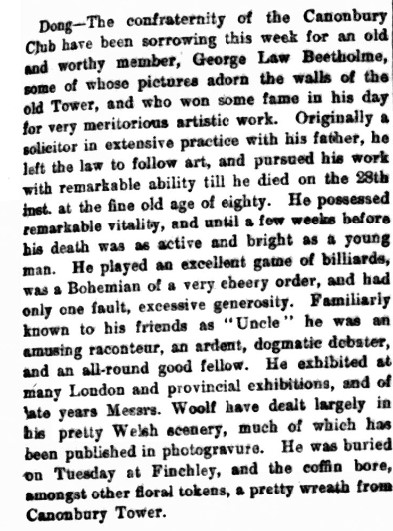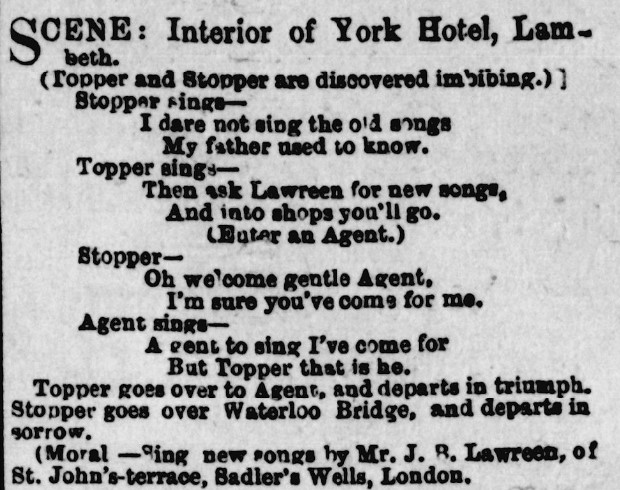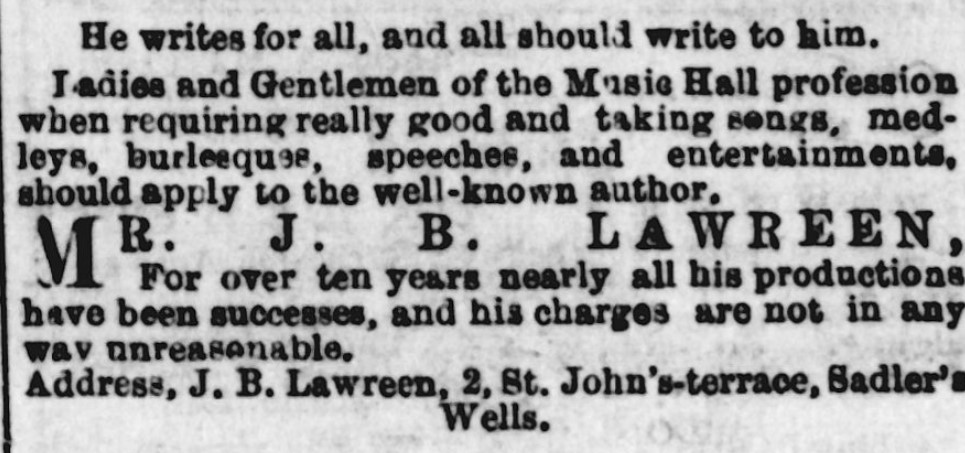The British Chess News team wishes all of our readers, viewers, listeners, tweeters and posters all the very best for the new year !
Monthly Archives: December 2023
Minor Pieces 67: George Law Francis Beetholme
One of the fun things family historians like to do is the One Name Study. You take an unusual surname and find out everything you can about all the bearers of that name.
I have an interest (I’ll explain more later) in the very rare, and now, I believe extinct, at least in that form, name BEETHOLME. I randomly typed ‘Beetholme chess’ into Google and discovered that one of their number, George Law Francis Beetholme, was a published problemist.
#3 777 Chess miniatures in three 1908
Here’s one of his problems, a mate in 3 anthologised by the very interesting E Wallis (the subject of a future Minor Piece) in his self-published collection. I don’t know where or when it was first published: if you know, do get in touch.
Beetholme is an area of Keswick, in the Lake District, and for centuries the name was common in nearby Kendal, often in variants such as Beethom. Our interest starts with John Law Beetholme, who was born in Liverpool, but moved to London where he worked as a solicitor. His eldest son, George, born in 1826, originally worked in his father’s legal practice, but, in a radical change of career, decided to become an artist. His paintings, very collectible today, were landscapes, often featuring mountains, rivers and waterfalls.

This pair of highland river scenes is, at the time of writing, on sale for £1750.
I don’t know whether or not he was a chess player, but, according to his obituary, he played an excellent game of billiards.

His only child, a son, George Francis Law Beetholme, born in 1857, was, like his father, an artist. It was he who appears to have been the chess problemist. Here’s a mate in 2 from 1882, which was reprinted in the Adelaide Observer a few weeks later, so it must have been quite highly thought of.
#2 The Illustrated London News 11 Feb 1882

Sadly, there’s not much more to say. Perhaps he was already in poor health: five years later he died at the age of only 30. The cause of his death was given as Phthisis (tuberculosis) and Morbus Cordis (heart disease).
I’ve only been able to find one other problem, published later in 1882, though there may well be others around somewhere. There are a lot of duals involving discovered checks with the knight in some variations, which perhaps wouldn’t be acceptable today.
#2 The Illustrated London News 9 Sep 1882
George Law Francis Beetholme, then, was very much a Minor Piece in the world of chess problems: perhaps even, you might think, a pawn. A promising career cut short by ill health, I suppose.
You might be wondering about my interest in the Beetholme family. George the artist had a brother named John, born in about 1839, who also lived a bohemian life following artistic pursuits, although he used a pen rather than a paintbrush.
Using the nom de plume J B Lawreen (sometimes J Beetholme Lawreen) he was, from about 1869 onwards, a writer of comic sketches and sentimental music hall songs.

In the same business, then, as Noel Johnson, except that he wrote the words while Noel composed the music. There’s no evidence that they ever collaborated.

In 1879 he married a dancer named Emily Willis, but the relationship didn’t last long and he later had an affair with Mary Elizabeth Bonsor, born in 1862, who had been orphaned at the age of only 3 when, a few weeks after her mother’s death, her father, in a fit of despair, took his own life. Two children were born: a son named John, and a daughter, whose name was registered as Alice, but who was later known as Lilian or Lily. In 1924 Lilian married a 63 year old widower, John Judd Abrahams: they had two sons. One of their grandsons, Steve Abrahams, who now lives in Tonbridge, has been researching his family history.
Steve has a strong DNA link with me which suggests we’re somewhere in the region of 4th cousins. I know from my shared links that it concerns my maternal grandmother’s family, and he knows from his shared links that it concerns his paternal grandfather’s family. There’s no obvious connection from our family trees so it’s a question of identifying a point where one of my relations and one of his relations might have been in the same room at the same time.
One possible scenario is this. John Judd Abrahams was born on 31 December 1860 in Gillingham Street, very near Victoria Station. According to both birth and baptism records his parents were David Abrahams and Ann Judd, who had married in Brighton in 1855. David was a servant, presumably working in hotels or boarding houses, and it’s quite likely Ann was in the same industry. Unfortunately the relevant page from the 1861 census, which might have been very informative, is lost, but there’s no indication that David and Ann spent any time together after their marriage, or that they had any (other) children. Steve also has no Abrahams DNA connections going any further back, so it’s plausible that John’s father was someone staying at or visiting a boarding house near Victoria Station. The relevant branch of my family was, at that time, mostly in the Northamptonshire village of Croughton, but there’s one possibility.
My great great grandfather Robert Padbury (he changed his name from Badby) had a brother named William (born in 1831) who served in the 97th Regiment of Foot. He was in Canada in 1856, and in India for the Indian Mutiny in 1857-58. On 1 June 1860 he was transferred to Madras. Might he have been in London a few months before that date awaiting instructions? Might he have travelled from India by boat, and then to London by train? He wouldn’t have arrived at Victoria Station, which only opened in October 1860. Might he have been in England on leave? Might he have been staying in a boarding house in central London and looking for a good time? I don’t know: I wasn’t there: but this theory would make Steve my 3rd cousin once removed, which would be about right. It would also make the short-lived problemist George Law Francis Beetholme the paternal 1st cousin of the wife of my 1st cousin 3x removed.
(Just to conclude William’s story, he returned from India, marrying in 1864 in Croydon, served by regular trains from Victoria, and fathering two daughters, one of whom died in infancy. )
Join me again soon for another story of a chess family with an unusual surname.
Problem solutions: click on any move to play them through.
Sources and Acknowledgements:
ancestry.co.uk
findmypast.co.uk
Wikipedia
Steve Abrahams
Yet Another Chess Problem Database (yacpdb.org)
ChessBase
Richmond Junior Chess Club 1975-2006: Part 5
I left you last time as the calendar ticked over to replace the 1 with a 2. January 1 2000. A new century.
The year 2000 was one with an international focus for Richmond Junior Chess Club. In January, we hosted a team of five young players from South Korea. They came over with our friend Jinwoo Song, a regular competitor in our rapidplay tournaments, who was now coaching in his home country. We ran a four-way team tournament, with six players in each team. Jinwoo played on top board for the Korean Krushers against the Richmond Raiders, the Richmond Rebels and the Richmond Renegades. They also played a match against Sheen Mount Primary School.
In July we had a visit from a Czech team from Frydek-Mistek, whose players have had a long association (continuing to this day) with English juniors. We ran a rapidplay tournament including some of the South of England’s strongest juniors, followed by a match between our team and theirs.
Here are two games: click on any move for a pop-up window.
But it was clear that the times were changing. Junior chess – and childhood itself – was becoming very different from when I was growing up.
In brief, and I’ll write a lot more about this at another time and (perhaps) in another place, it was changing from a hobby for older children into a learning tool for younger children. The primary school chess clubs about which I was sceptical provided very little retention. Up to 2000 we were able to feed through the stronger players into our morning group, but at that point some sort of football league for children of primary school age started up in the borough, so we were no longer able to do that to any great extent.
Another thing that had changed was my relationship with the parents on our committee. When I was running the club unpaid I was seen as a friend, and, because I was doing it for free, was respected so much that I received an award from the BCF (as it then was) and it was even proposed that I should be nominated for an award in the Queen’s honours list. Every Christmas I’d receive enough wine and chocolates to last me until Easter. Even now I still exchange cards with a number of the parents from that time every December. But now I was being paid I was just a dispensable employee of the committee, so the gifts stopped. While I had enough money to buy as much wine and chocolates as I wanted throughout the year, for me that wasn’t the point.
I eventually reached the conclusion that I wanted to leave Richmond Junior Club at some point, and, because 30 years seemed like a good length of time to run the club, decided that the 2004-05 season would be my last. This would give the committee time to identify a replacement for me.
As chance would have it, in January 2002 a young man approached me after one of our Richmond Rapidplays offering to help. He appeared friendly and enthusiastic, and, although he wasn’t a very strong player, he was good enough to work with less experienced players. So the committee agreed to invite him along and give him a trial.
Everything went well: he was very popular with most of the children, and most of the parents also liked him. In addition, he seemed to be very much in tune with what we were trying to do. He also had contacts with a lot of strong players, which was very helpful.
After a while the committee appointed him as my deputy, with the intention that he would take over when I retired. CRB checks (as they then were), which had been introduced in 2002, were carried out successfully.
Meanwhile, my views on junior chess, in particular the best ways to teach beginners and promote chess in schools, were changing.
In 2000 I started developing a website, chessKIDS Academy, promoting online chess services for children. I sold the original domain some years ago and am no longer developing or maintaining the site but you can still find it here.
In 2001 a new school, Hampton Court House opened (it’s still there under the same name, but under different ownership and management), taking children of both primary and secondary school age. Its Director of Studies, Guy Holloway, was a keen chess player and wanted to make chess part of the school. I was invited to become involved and we used the school as a venue for a few tournaments. The school was more than happy to accept children who had struggled to fit in mainstream schools, as well as a bunch of eccentric teachers. It was, in many ways, an ideal environment for me, and I soon became a valued member of the school community. Getting to know all the children, not just those who played chess, as well as the parents and the members of staff, not all of whom were interested in chess, taught me to wear a teacher hat rather than a chess hat when thinking about how to promote and organise chess in schools.
By now I was reading extensively about various aspects of childhood: child development, educational theory, parenting, the history of childhood, as well as looking at the history of children’s chess, which again enabled to contextualise my views.
In 2003 I published two articles in CHESS. The first outlined my issues with primary school chess clubs and promoted chessKIDS Academy. The second published the results of an experiment carried out to investigate how children made decisions over the chessboard. I promised more articles, but never wrote them.
In 2004 I started investigating the Steps Method, used extensively in The Netherlands and also in other West European countries, which offered a very different philosophy to that of our after-school chess clubs. Looking also at courses based on methods used in the former Soviet Union, it was clear to me that this must have been an influence. Although I had some reservations about how it would fit in to our system, most of it made a lot of sense to me. I could see exactly why the primary school chess clubs in our area didn’t produce any significant retention.
Everything I was reading confirmed my opinion that promoting mass participation in chess in primary schools, while superficially attractive, was, in the long term, counter-productive.
But my views proved unpopular with parents and teachers, who didn’t want me to stop their children having fun playing low level chess, and with my chess teaching colleagues, who didn’t want me to stop them earning a living.
Over the previous few years there had been a decline in standards (we were doing just as well in competitions against other areas, so this was nationwide) and also in behaviour. While most of our children were genuinely enthusiastic about chess and wanted to be there, we were also attracting children who were less interested, and, consequently, in some cases less well behaved who were being signed up because their parents saw possible extrinsic benefits which might help them academically.
Two of our members from this period are now International Masters. Here’s a game from Yang-Fan Zhou.
Callum Kilpatrick sometimes plays for Richmond in the London League.
In February 2005 the world of Richmond Junior Club was turned upside down when a boy made an allegation of sexual assault against our young deputy director, who vehemently denied that any impropriety had taken place. The boy’s father, quite correctly reported the allegation to the police and social services. As it happened, a few years earlier one of the parents on our committee had been discovered with child pornography on his computer, and social services jumped to the conclusion that RJCC was the front for a paedophile ring. As a (then) middle-aged bachelor who spent a lot of time with young children I felt I was under suspicion myself.
The Crown Prosecution Service decided there was a case to answer, but were forced to drop it because the boy wasn’t prepared to testify in court. Our parental committee (I played no part in their decisions in this case) decided to keep him on but watch him closely, hoping this would give him the opportunity to seek help. Of course there was now no way he could take over my role as club director, so, in the short term, I had to remain in place, although my heart was no longer in it. The allegation against my deputy and potential successor was only one reason.
At the end of April 2006 we were contacted by the organiser of a foreign tournament in which our deputy director was taking part, informing us that he’d been arrested. Telling us the reason would have been a breach of confidentiality, but of course we had our suspicions. We eventually discovered that the reason for his arrest made it impossible for him to continue working with children. When he returned to England he was removed from his post at RJCC, although he continued playing in tournaments, even holding an office within the British Chess Federation until the start of the following year.
Meanwhile, by September 2006, other arrangements had been made, and Richmond Junior Chess Club was now, after 31 years, being run by someone else. What happened then is not my story to tell.
At the end of this five-part, 30+ year saga, I have some final thoughts.
If you know me you’ll know that I’m an extreme introvert, quiet, self-effacing, non-confrontational. I’m not an amazingly strong chess player. I’m not good at addressing an audience or controlling a class of children. Exactly the opposite of the qualities expected of a leader, you might think, but, nevertheless, I ran the strongest junior chess club in the country – and one of the strongest in the world – for many years, with methods, philosophy and governance very different from those used in any other children’s chess club of my knowledge. Yes, I was lucky to be in the right place at the right time, and to meet the right people, most importantly Mike Fox, but I suspect you need something more than just luck.
I’ve always known that without chess I wouldn’t have had a happy and worthwhile life, and that the least I could do in return was to devote my as much of my life as I could to helping children play chess. But, as I didn’t come from a chess background, today’s primary school chess clubs wouldn’t have helped me much, and nor would today’s professionally run clubs have been suitable.
The introduction to chess I had in the 1960s was ideal for me, but now junior chess, at least in my part of the world, was no longer for teachers like me (classroom management skills, which I don’t have, are required), nor, more importantly, for children like me.
I eventually realised that the problem was societal rather than specifically chess related, and that my friends and former colleagues in the junior chess world were meeting demands from parents and schools. But I didn’t think it was doing either chess or children any favours.
There are signs that things might be changing: I’ll have a lot more to say about this another time, and probably in another place. If you’d like to speak to me about the way we used to run our club, feel free to get in touch.



